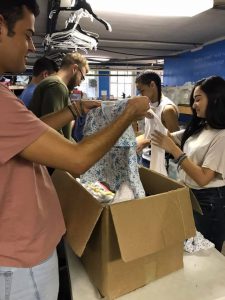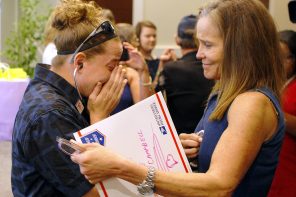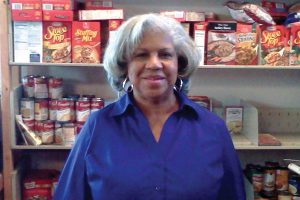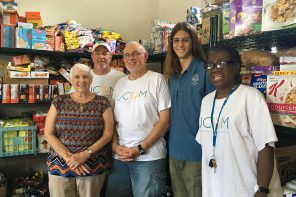
Students from local colleges help sort clothes for the Downtown food and clothing bank.
The folks at Downtown Ecumenical Services Council (DESC) don’t need fancy statistics to tell them hunger is a serious problem in the River City. “One interesting way DESC measures the seriousness of hunger in Jacksonville is when we look out our front door and see the line of people waiting around the block,” said Beth Hood, director of operations. “They are coming to get food.”
DESC, a charitable agency founded in 1981 by urban Jacksonville churches to provide emergency assistance to people in need, served 12,187 desperate families last year. This number has nearly than doubled from the amount served 10 years ago, and looking at the numbers from January to July 2017, there is every indication that DESC provisions will surpass last year, said Hood.
“Our core program has been the distribution of food to the hungry,” said Hood. “Over the past 10 years, DESC fed approximately 9,000 families, and usually one third of these are children. Summer months are always higher because children are at home and do not receive food at school. Since the quality of our food has improved with the addition of fresh produce and meats, we are seeing an increase in clients needing food. We credit this increase to the enhanced quality of the food we distribute, but the increased numbers may also reflect the growing number of people needing help. We are on track to feed close to 12,000 this year,” she said.
Located on North Ocean Street, DESC provides clients with enough groceries to cover three to five days, as well as gently used clothing and financial assistance in the form of rent, mortgage, and utility payments. DESC partners with Dignity U Wear and Presbyterian Social Ministries in providing clothing assistance.
The bulk of the food DESC distributes comes from Feeding Northeast Florida and Farm Share, but its pantry also receives supplies from community food drives hosted by schools, churches, and businesses, said Hood.
“One interesting way DESC measures the seriousness of hunger in Jacksonville is when we look out our front door and see the line of people waiting around the block.”
“Over the past year, we have been able to augment our food program with a greater balance of fresh fruits, vegetables, meats, and eggs,” Hood said. “Previously, we offered canned goods and dry foods. This has changed dramatically by utilizing free or extremely low-cost foods from Feeding Northeast Florida and the United States Department of Agriculture (USDA) Farm Share program, coupled with a generous grant from the Lucy Gooding Foundation.
“Procurement of this food involves weekly trips to get truckloads of food. Our records show the food we collected for over 12,000 families totaled over 92 tons!” she said, adding the partnership with Feeding Northeast Florida allows DESC to use Gooding Foundation funds to purchase meat, chicken, cereal, tuna, and peanut butter at 18 cents a pound. “This, coupled with the fresh produce and other goods we get for free, has greatly enhanced the quality and quantity of the food we distribute.”
Instrumental in working with Feeding Northeast Florida and Farm Share for DESC has been Judy Davis of Ortega, who procures fresh produce and meats from these agencies and organizes delivery and storage. “We call her our ‘Secret Weapon’ or perhaps our ‘Shopping Diva,’ said Hood. “Several times a week, Judy and a troop of volunteers tackle the food bins selecting the best buys, the freshest produce, and other items we need.”
Scott Meyer, an Avondale native, also assists by donating 300 pounds of gourmet brown rice each week, which is grown on his family farm, Congaree and Penn Farm & Mills. “What a treat for our clients! The farm, located 20 minutes from downtown Jacksonville, grows a tasty Jupiter medium grain on four acres of Japanese-style rice paddies,” said Hood.
DESC, which keeps its food pantry open five days a week, also gives clients a referral sheet of 22 food pantries, the majority of which are only open two days a week, so they can be used as additional resources.
Many DESC families fall under the category of working poor – people who earn too much to be part of the federal government’s Supplemental Nutrition Assistance Program (SNAP) referred to as food stamps, which allows a mere $4 per person per day for food. DESC also serves elderly and disabled people on fixed incomes, who often choose between paying for essentials and buying nutritious food. “This program is designed to supplement a low-income family’s ability to purchase groceries,” said Hood. “Supplemental food from our food bank means a person can reallocate a portion of their grocery money towards rent, utilities, medicine, or transportation.”
Each year, DESC hosts two annual fundraisers to help with specific needs: The Great Electric Emergency in the spring to raise money to help clients pay their electric bills, and the Great Underwear Challenge, which provides clients with new underwear and socks. A big fall fundraiser, “Where’s Bubba?” raises money for the nonprofit’s general operational support.
Like many other nonprofits, DESC needs more volunteers to serve in its food pantry. It also seeks volunteers with trucks or large vehicles to help transport food. “We need this type of help several times a week,” said Hood. Community support through food drives earmarked for DESC are also welcomed.




